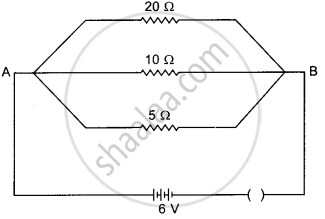Advertisements
Advertisements
Question
A resistor has a resistance of 176 ohms. How many of these resistors should be connected in parallel so that their combination draws a current of 5 amperes from a 220 volt supply line?
Solution
Suppose x resistors should be connected in parallel to draw a current of 5 A.
For a parallel combination, 1 / R = 1 / R1 + 1 / R2 + 1 / R3 + ... (x times)
Here, R1 = R2 = R3 = ... = 176 Ω
Then the resultant resistance, R = 176 / x Ω
Given that the current, I = 5 A and voltage, V = 220 V
Then by Ohm's law, V = IR
By substituting the values, we get:
`220=5xx176/x`
x = 4
Hence, four resistors of 176 Ω each should be connected in parallel to draw a current of 5 A from a 220 V supply line.
APPEARS IN
RELATED QUESTIONS
An electric heater which is connected to a 220 V supply line has two resistance coils A and B of 24 Ω resistance each. These coils can be used separately (one at a time), in series or in parallel. Calculate the current drawn when:
(a) only one coil A is used.
(b) coils A and B are used in series.
(c) coils A and B are uses in parallel.
In parallel combination of resistances ______.
What is the equivalent resistance of 5 equal resistors, each of value 2`Omega` 1 when oonnected in (a) Series ( b) ParaIleI?
The equivalent resistance of a parallel combination of two resistors of 30 Ω and 60 Ω is ______________.
Solve the following question:
In an electric circuit, two resistors of 12 0 each are joined in parallel to a 6 V battery. Find the current drawn from the battery.
Two resistors when connected in parallel give the resultant resistance of 2 ohms, but when connected in series the effective resistance becomes 9 ohms. Calculate the value of each resistance.
Calculate the current flows through the 10 Ω resistor in the following circuit.

You are given four ammeters A, B, C and D having the least counts mentioned below:
(I) Ammeter A with least count 0.25 A
(II) Ammeter B with least count 0.5 A
(III) Ammeter C with least count 0.05 A
(IV) Ammeter D with least count 0.1 A
Which of the ammeters would you prefer for doing an experiment to determine the equivalent resistance of two resistances most accurately, when connected in parallel?
A piece of wire of resistance R is cut into three equal parts. These parts are then connected in parallel. If the equivalent resistance of this parallel combination is R1, what is the value of the ratio R1 : R?
Two resistors of resistances 2 Ω and 3 Ω are connected in parallel to a cell to draw current 0.5 A from the cell. Draw a labelled diagram of the arrangement
